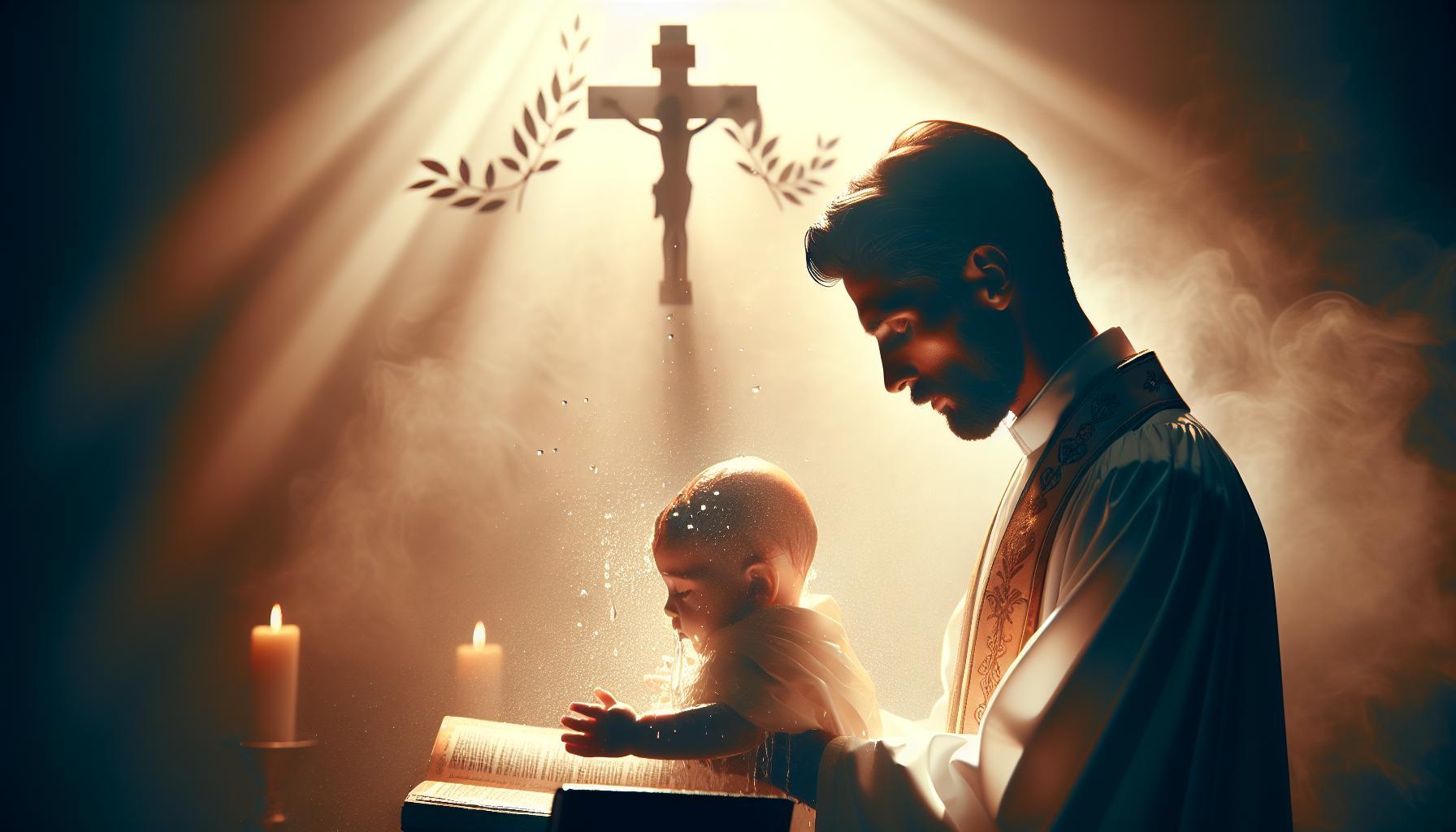Navigating the ins and outs of gift-giving for a baptism can be tricky—what’s the appropriate amount? Understanding modern etiquette and acceptable gift ranges is essential to ensure your gesture feels thoughtful rather than overwhelming. This guide will illuminate how much to give, helping you celebrate this meaningful occasion with ease and grace.
Understanding the Significance of Baptism Gifts
Understanding the value of baptism gifts goes beyond mere material offerings; these gifts symbolize a deep connection to faith, family, and community. When attending a baptism, it’s essential to recognize that your gift serves as a lasting reminder of this special occasion, representing your support for the child’s spiritual journey. Baptism gifts can take various forms, from traditional religious items to personalized keepsakes, each intended to convey love and well-wishes for the baptized.
In modern practice, many often ask: *How much do you give for a baptism gift?* This can be influenced by several factors, including your relationship with the child and their family, local customs, and your financial situation. While there is no hard and fast rule, many people typically consider a range of $25 to $150 when selecting a baptism gift. Ultimately, the intent behind the gift is what matters most. Thoughtful gestures, regardless of their monetary value, are appreciated and remembered.
Types of Baptism Gifts
When pondering the relevance of your gift, consider the following popular categories:
- Religious Items: These include crosses, rosaries, and bibles, which serve as spiritual guidance.
- Personalized Keepsakes: Customized gifts like engraved photo frames or blankets commemorate the day uniquely.
- Books: Children’s religious storybooks can enrich the child’s understanding of their faith.
- Clothing: Traditional attire, such as christening gowns or suits, can be cherished for years.
When choosing a baptism gift, think about the child’s family background, traditions, and preferences. For instance, a family deeply rooted in religious customs may appreciate a beautifully crafted baptismal cross, while a modern family might prefer a personalized storybook that celebrates faith in a contemporary context.
Practical Gift-Giving Tips
Consider these practical tips to guide your gift choice effectively:
| Factor | Consideration |
|---|---|
| Relationship | Closer ties may encourage more significant gifts. |
| Personal Taste | Choose items that reflect the family’s values or lifestyle. |
| Local Customs | Research typical gift-giving practices within the community. |
| Budget | Stick to a comfortable spending limit; thoughtful gifts are what’s truly important. |
Understanding the intricate significance of baptism gifts can guide your selection, ensuring it resonates deeply with both the family and the spiritual essence of the occasion. By embracing the timeless tradition of gift-giving within the context of baptism, you affirm your support for the child’s spiritual path while honoring the values and beliefs of their family.
Traditional vs. Contemporary Gift-Giving Practices
The evolution of gift-giving customs, particularly in the context of significant life events such as baptisms, reveals a fascinating intersection between tradition and modernity. Historically rooted practices often emphasized the significance of physical gifts as tokens of faith and commitment, while contemporary approaches increasingly prioritize the sentiment behind the gift, affording a broader range of options to express love and support.
Traditional Gift-Giving Practices
Traditionally, baptism gifts often included items that held religious significance or were intended for the child’s spiritual growth. Common gifts in these categories go beyond mere mementos; they embody a pledge of guidance and mentorship in the child’s faith journey. Some classic examples of baptism gifts include:
- Religious symbols: Crucifixes, rosaries, or other religious artifacts.
- Personalized keepsakes: Engraved frames or baby books that commemorate the baptism.
- Clothing: White baptism gowns or special outfits associated with the ceremony.
Alongside these traditional offerings, it is common for close family members to give gifts that are perceived as foundational for the child’s future, such as savings bonds or investments, thus intertwining financial foresight with the celebratory occasion.
Contemporary Gift-Giving Practices
In contrast, today’s gift-giving landscape has shifted towards more personalized and experience-oriented gifts. Modern etiquette advocates for mindfulness regarding the parents’ preferences and the child’s immediate needs, allowing for a wider range of expressions. Notably, when considering “How Much Do You Give for a Baptism Gift? Modern Etiquette and Ranges,” the emphasis is less on material value and more on thoughtfulness.
Current practices might include:
- Gift cards: Perfect for parents to select items or experiences they truly want.
- Charitable donations: Contributing to a charity in the child’s name resonates well with families who value social responsibility.
- Experience gifts: Memberships to local zoos, museums, or classes are becoming increasingly popular.
Additionally, the choice of how much to give can vary based on factors such as your relationship with the family and regional customs. For instance, closer relatives may opt for higher financial values in their contributions, while acquaintances might stick to modest, yet meaningful tokens.
| Relationship to the Child | Suggested Gift Amount |
|---|---|
| Parents’ close friends | $75 – $150 |
| Extended family | $50 – $100 |
| Acquaintances | $25 – $50 |
As society continues to evolve, so too will the nuances of how we choose to celebrate significant milestones like baptism. Striking a balance between traditional values and contemporary flexibility in gift-giving not only honors the occasion but also reflects the uniqueness of each family’s journey.
Factors to Consider When Choosing Your Gift Amount
Choosing the right gift amount for a baptism can feel overwhelming, especially given the variety of factors that come into play. This significant event marks a spiritual milestone for many families, and your contribution can reflect not only your affection but also your understanding of social norms and etiquette. Here are some key considerations to help you navigate this delicate decision.
Relationship to the Child and Family
Your closeness to the family and child plays a crucial role in deciding how much to give. For instance:
- Immediate family members: If you’re a parent or sibling, contributing a larger amount—typically in the range of $100 to $200—might be expected.
- Close friends: As a close friend of the family, consider giving between $50 and $100, demonstrating your support while respecting your budget.
- Extended family or acquaintances: For more distant relatives or friends, a thoughtful gift of $20 to $50 would be sufficient, emphasizing sentiment over size.
Regional Etiquette and Cultural Norms
Regional differences can significantly influence expected gift amounts. In larger cities or affluent areas, the expectations may skew higher, while in more rural or tight-knit communities, even smaller gifts can hold great sentimental value. For example, if you attend a baptism in a high-cost living area, you might lean toward the upper end of the ranges. Conversely, if the event is within a community where simplicity is celebrated, a smaller, heartfelt gesture can resonate just as strongly.
Your Personal Budget
While it’s important to show your support and celebrate such a momentous occasion, your financial situation should dictate your gift amount. Remember, the thoughtfulness of your gift far outweighs its price. If you’re on a tighter budget, consider non-monetary gifts that reflect your affection, such as handmade items or personalized keepsakes. Spending within your means allows you to give without the stress of financial strain, ensuring you can enjoy the celebratory event fully.
Sample Table of Appropriate Gift Amounts
| Relation | Suggested Gift Amount |
|---|---|
| Immediate Family | $100 – $200 |
| Close Friends | $50 – $100 |
| Extended Family | $20 – $50 |
| Aquaintances | $10 – $25 |
Balancing these factors not only guides you in making an appropriate decision but also allows you to participate meaningfully in a cherished ritual. Whether your contribution is monetary or a heartfelt token, ensuring it aligns with your relationship to the family and your personal circumstances can lead to a satisfying and considerate gift-giving experience.
Exploring Average Gift Ranges for Different Circumstances
When contemplating the ideal contribution for a baptism gift, it’s essential to navigate the intricate landscape of social norms and expectations. Understanding the average gift ranges for different circumstances can help inform your decision and ensure that your offering is both thoughtful and appropriate. With various factors influencing what is deemed an acceptable or generous gift, consider how the specific context can affect the amount you ultimately choose to give.
Gift Ranges Based on Relationship
The relationship you have with the baptized child or their family plays a pivotal role in determining the appropriate gift amount. Here’s a quick breakdown of common relationships and corresponding gift ranges:
| Relationship | Typical Gift Range |
|---|---|
| Close Family (Parent, Sibling) | $100 – $200 |
| Extended Family (Grandparents, Aunts, Uncles) | $50 – $150 |
| Close Friends | $50 – $100 |
| Acquaintances or Colleagues | $20 – $50 |
These ranges offer a solid starting point, but remember that the essence lies in the sentiment behind your gift rather than the monetary value alone.
Consideration of Event Type
The type of baptism celebration can also influence how much you should give. A more intimate ceremony might call for a smaller token of affection, while larger gatherings, perhaps at a church with extensive guest lists, may create an atmosphere where higher amounts are more traditional.
Here’s a guide based on event size:
- Small Family Baptism: $25 – $75
- Medium Gathering (Close Friends and Family): $50 – $150
- Large Baptism Celebration: $100 – $200
In any case, the key is to avoid feeling pressured by what others are giving. Focus on your relationship and the joyous occasion when making your decision.
Cultural Variations
Lastly, it’s vital to remember that cultural context can shape gift-giving norms significantly. In some cultures, monetary gifts are the predominant form of celebration, while others may favor physical tokens or religious artifacts. Understanding these nuances can further guide you in determining how much to give for a baptism gift.
Being attuned to the diverse practices and preferences can help you select a gift that resonates well within the cultural framework of the family. Aim to enrich the baptism experience with a gift that speaks to shared values and traditions, ensuring your thoughtfulness shines through.
Personalizing Your Gift: Beyond Monetary Value
When it comes to selecting a baptism gift, many often find themselves caught up in the monetary value—how much should you spend to be considered generous? However, the true essence of gift-giving transcends dollars and cents. Personalizing your gift adds a profound layer of meaning that can strengthen bonds and create lasting memories. In fact, a thoughtful, personalized gift often holds more sentimental value than an expensive, yet generic, item.
Understanding Personal Touches
Think beyond traditional gift ideas and tap into the emotional significance of the occasion. Personal touches could include:
- Custom Engravings: Consider items like a silver cross or a keepsake box with the child’s name and baptism date inscribed.
- Handwritten Notes: Accompany your gift with a heartfelt note expressing your blessings and hopes for the child’s future.
- Unique Experiences: Gift the family a voucher for a family outing or an event that can become a cherished memory.
- Handmade Gifts: Crafts or knitted items add a special touch of warmth and care.
These thoughtful gestures can often resonate more deeply than any store-bought gift, ultimately making the occasion more memorable.
Crafting a Meaningful Gift Package
To really enhance your gift, consider creating a personalized gift package. Here’s how you can structure your offering:
| Gift Component | Description |
|---|---|
| Baptismal Certificate Frame | A beautiful frame that holds the baptismal certificate, perhaps personalized with the date and child’s name. |
| Children’s Bible or Storybook | A classic book, ideally personalized with an inscription or the child’s name. |
| Memory Book | A book where parents can jot down milestones, memories, and messages for their child’s baptism day. |
By curating a collection tailored to the child’s family values and beliefs, you emphasize your understanding of their unique journey. Embracing this approach can transform your gift into a cherished keepsake, reinforcing the significance of the milestone.
A Final Thought
Ultimately, while many are inclined to ask, “How much do you give for a baptism gift?” it’s the sincere thought and effort you invest that will leave a lasting impression. Each carefully chosen element reflects not just the occasion but also a deep connection to the family. Striving for personalization over price ensures your gift will hold a distinguished place in their memories for years to come.
Understanding Cultural and Religious Influences on Gift-Giving
Gift-giving practices can vary significantly based on cultural and religious contexts, making it essential to understand these influences, especially when it comes to events like baptisms. For many, a baptism represents not only a spiritual journey but also a community celebration, where communal values play a pivotal role in shaping expectations around gifts. In different cultures, the significance of the baptism gift can range from a simple token of love to a substantial financial contribution, reflective of one’s socioeconomic status and the depth of their relationship with the family.
Religious Influences on Gift-Giving
The religious significance attached to a baptism often dictates the nature and value of gifts. For instance, in Christian communities, baptism is a rite of passage that may be celebrated with substantial gifts intended to symbolize the child’s spiritual journey. Common gifts can include religious items such as bibles or crosses, which carry both sentimental and spiritual value. Understanding these nuances is crucial; attending a baptism in a Catholic family might prompt a different gifting etiquette compared to a ceremony in a Protestant or Orthodox context, due to their unique traditions and expectations.
Cultural Considerations and Practices
Cultural traditions also play a pivotal role in determining how much one might consider giving. In some cultures, monetary gifts are preferred and viewed as a practical way to support the family, particularly in communities where families are raising children with hopes of financial stability. Here’s a brief overview of cultural practices regarding baptism gifts:
| Culture | Typical Gifts | Gift Value Range |
|---|---|---|
| Western Christian | Religious items, clothing | $50 – $150 |
| Eastern Orthodox | Gold crosses, savings bonds | $100 – $500 |
| Cultural Traditions (e.g., Hispanic) | Monetary gifts, family heirlooms | $75 – $200 |
In many cultures, the act of choosing a meaningful gift often carries deeper implications. Gifts are seen as blessings, reinforcing bonds within the family and community. When considering how much to give for a baptism gift, it’s essential to factor in these cultural and religious influences, which can vary widely. Understanding this context helps in making thoughtful decisions that align with both personal intentions and social expectations.
Ultimately, the focus of gift-giving during baptism ceremonies lies in the spirit of generosity and community support, allowing individuals to contribute meaningfully to this significant milestone in a child’s life.
Tips for Selecting Meaningful Baptism Gifts Across Denominations
Choosing the perfect baptism gift is not solely about the monetary value; it reflects your thoughtfulness and consideration for the child and their family. Gifts can hold deep significance across various denominations, so understanding the recipient’s beliefs and values will enhance the emotional weight of your selection. Whether opting for traditional keepsakes or personalized items, the goal is to present a gift that resonates spiritually and emotionally.
Understand the Denomination
Each denomination may have unique traditions or items that are particularly cherished during baptism ceremonies. For instance, Catholic families might appreciate gifts such as a personalized rosary or a silver cross, while Protestant families may prefer a beautifully illustrated children’s Bible. Taking the time to research or inquire what is appropriate within the family’s faith will show respect and consideration.
Consider the Age of the Recipient
The child’s age plays a crucial role in determining the appropriateness of a gift. For infants, items like plush toys or baptismal gowns are delightful and useful, creating lasting memories. For older children, consider gifts that promote spiritual growth, like faith-based books or art. Here’s a simple guide to ages and gift ideas:
| Age | Gift Ideas |
|---|---|
| Infant | Plush toys, personalized blankets |
| Toddler | Storybooks about faith, musical crosses |
| Child | Children’s Bible, faith-themed games |
| Teen | Journals, confirmation memory boxes |
Personalization Adds Meaning
A personalized gift can make your offering more significant. Engraving the child’s name, baptism date, or a meaningful quote can transform a simple item into a cherished keepsake. Consider items such as customized picture frames, books, or even jewelry. The thoughtfulness of personalization unveils a deeper level of care and commitment to celebrating this sacred occasion.
In conclusion, while determining how much to give for a baptism gift may often come down to personal financial comfort, focusing on the thoughtfulness and relevance of the gift within the recipient’s faith and age demonstrates a genuine willingness to honor this pivotal moment in their spiritual journey.
Providing Gifts for Special Circumstances: Siblings, Godparents, and More
When it comes to selecting gifts for special occasions like baptisms, knowing how to navigate relationships can be just as important as choosing the right gift itself. Each person involved in the event, from siblings to godparents, holds a unique significance that can influence not just the type of gift given, but also the expected monetary range. Understanding these dynamics can enhance the meaningfulness of your gesture while adhering to contemporary gifting etiquette.
Gifts for Siblings
Siblings often play an intimate role in a child’s life, providing constant support and companionship. When considering a baptism gift for a sibling, it’s ideal to make your choice personal, reflecting the bond you share. Here are a few thoughtful ideas:
- Personalized Jewelry: A bracelet or necklace can serve as a cherished keepsake.
- Children’s Books: Books about faith or spiritual growth can help develop a sense of understanding about the baptism.
- Customized Gifts: Items like engraved picture frames featuring a photo from the baptism can become treasured mementos.
Monetary gifts for siblings tend to vary based on age and personal finances. Generally, gifting between $25 to $75 is appropriate, balancing thoughtfulness with practicality.
Gifts for Godparents
Godparents hold a special sacred role, often taking on responsibilities that extend beyond the baptism day. Acknowledging this relationship through a thoughtful gift is essential. The spectrum of what to spend can also broaden here due to the deeper commitment involved. Here are a few meaningful options:
- Religious Keepsakes: Consider choosing a framed print of a meaningful scripture or an artisan-crafted cross.
- Memory Books: A book where godparents can share thoughts and experiences helps preserve the history of their role.
- Gift Cards: Selecting a gift card to a favorite restaurant or bookstore allows them to treat themselves.
Typically, gifts for godparents can range from $50 to $150, reflecting the gravity of their role and the ongoing support they are expected to provide.
Considerations for Other Close Family Members
In addition to siblings and godparents, there are numerous other relatives who may wish to give a baptism gift. Aunts, uncles, and grandparents should also be acknowledged in a thoughtful manner. The type of gift might differ based on the relationship, but the principles remain similar.
- Gift Amount Recommendations: Generally, the range for close family members is around $30 to $100.
- Sentimental Touches: Items such as handmade gifts or family heirlooms can carry significant emotional weight.
- Experiential Gifts: Offering a family experience, like a membership to a local zoo or children’s museum, creates lasting memories beyond the baptism day.
Sharing these meaningful gifts is not only a way to honor the baptism itself but also a reflection of the relationships that enrich the child’s life. Understanding how much to give for a baptism gift within the context of modern etiquette involves more than monetary value; it is about the sentiments and connections that shape family ties.
Q&A
How Much Do You Give for a Baptism Gift? Modern Etiquette and Ranges?
The amount you give for a baptism gift can range from $20 to $100, depending on your relationship with the family and your budget. It’s important to consider your personal circumstances and the cultural background of the family.
When determining an appropriate gift, reflect on your connection to the child and their family. A closer relationship generally warrants a more generous gift. Also, keep in mind local customs, as some cultures may have specific expectations regarding gift amounts during significant religious events.
What are some traditional baptism gift options?
Traditional baptism gifts often include items like religious books, personalized candles, or jewelry. These gifts carry a spiritual significance and serve as lasting mementos of the occasion.
In addition to material gifts, offering a heartfelt card or contributing to a charitable cause in the child’s name can also be meaningful options. Think about what the family values, as personalized touches can make your gift even more special.
Why does baptism gift etiquette matter?
Baptism gift etiquette is important because it reflects your respect for the family’s traditions and values. A thoughtful gift can foster connections and express your support during this important spiritual milestone.
Understanding and adhering to norms helps prevent misunderstandings. By giving an appropriate gift, you show consideration for the family’s beliefs, enhancing relationships within your community and reflecting your commitment to unity and respect, which is a shared value across denominations.
Can I give a cash gift for a baptism?
Yes, giving cash as a baptism gift is generally acceptable. Many families appreciate the versatility of cash, allowing them to choose what they truly need or want.
When making a cash gift, consider including a thoughtful card that expresses your best wishes for the child’s spiritual journey. This adds a personal touch that showcases your warmth and care, reinforcing your bond with the family.
What is the significance of baptism gifts?
Baptism gifts symbolize support and blessings for the child’s spiritual journey. They mark an important transition in the child’s life and the family’s faith experience.
Such gifts can also serve as reminders of the commitment parents make to raise their child in the faith. Whether a religious item or a personal keepsake, these gifts help commemorate this special occasion.
How can I choose a meaningful baptism gift?
Choosing a meaningful baptism gift involves thinking about the family’s values and the child’s future. Consider personalized options that reflect the child’s faith journey, such as engraved jewelry or a custom baptism blanket.
It’s also helpful to consult the family or other close friends for ideas. Ultimately, your thoughtfulness in selecting a gift will be appreciated, creating lasting memories in the child’s life.
Are there any themes for baptism gifts?
Yes, common themes for baptism gifts include faith, love, and guidance. These themes reflect the spiritual significance of the event and can help shape your gift-giving choices.
Consider items that personify these themes, such as a children’s Bible, faith-based artwork, or a beautifully illustrated storybook about the baptism itself. By centering your gift around meaningful themes, you contribute thoughtfully to the child’s faith journey.
Final Thoughts
In conclusion, understanding the intricacies of baptism gift-giving requires both consideration and sensitivity to the significance of the event. By exploring the suggested ranges and modern etiquette, you can find a gift that honors the sacredness of the occasion while reflecting your personal relationship with the family involved. Remember, whether it’s a heartfelt card, a meaningful keepsake, or a thoughtful monetary contribution, the spirit of your gesture is what truly matters. We encourage you to further explore the diverse traditions surrounding baptism gifts in various cultures and denominations to enrich your understanding and appreciation. As you engage with this sacred tradition, may your actions reflect thoughtfulness, respect, and joy—celebrating new beginnings in faith.





